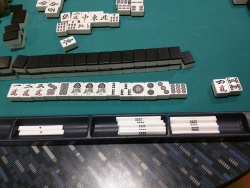Yaku compatibility

This is a table showing the compatibilities of the different yaku with each other. While yaku may be combined in one hand, it is simply impossible to combine certain yaku with each other.
Alternatively, some yaku can always imply another. For instance, a junchan hand has a terminal in every group. This also fits the definition of chanta, which mandates that the hand has a terminal or honor in each group. Every junchan hand is also a chanta hand, so chanta is not scored. By rule, two yaku cannot be combined if one always implies the other. (A partial exception is with shousangen. Shousangen always implies two dragon yakuhai, but does not always imply you have any one of "haku", "hatsu", or "chun".)
Yaku
| Key | |
|---|---|
| Abbrevation | Yaku |
| RCH | Riichi |
| DRI | Double riichi |
| IPP | Ippatsu |
| SMO | Mentsumo |
| TAN | Tanyao |
| PFU | Pinfu |
| IPK | Iipeikou |
| ITT | Ittsu |
| YAK | Yakuhai |
| SDJ | Sanshoku doujun |
| SDO | Sanshoku doukou |
| TOI | Toitoi |
| SNA | Sanankou |
| SNK | Sankantsu |
| CHA | Chanta |
| JUN | Junchan |
| RPK | Ryanpeikou |
| SSG | Shousangen |
| HRO | Honroutou |
| HON | Honitsu |
| CHN | Chinitsu |
| CHI | Chiitoitsu |
| RIN | Rinshan |
| HAI | Haitei |
| HOU | Houtei |
| CHK | Chankan |
Yaku strategy involves viability to form yaku and maximizing hand value, if possible. This maximization often involves the recognition of the different yaku forming in one hand. Often, this affects the decision which tiles to keep and which to discard.
Three combinations actually form yakuman:
- Toitoi + Junchan = Chinroutou
- Toitoi + Mentsumo = Suuankou
- Honroutou + Junchan = Chinroutou
- Daburu riichi + Chankan is only possible with a Kokushi musou hand
Some combinations form a different yaku which implies one component of the combination, and as a result can never be counted:
- Toitoi + Chanta = Toitoi + Honroutou
- Chiitoitsu + Chanta = Chiitoitsu + Honroutou
- Honitsu + Tanyao = Chinitsu + Tanyao
- Honitsu + Junchan = Chinitsu + Junchan
- Chinitsu + Chanta = Chinitsu + Junchan
These combinations are marked with ![]() in the table below.
in the table below.
Whether or not these combinations are actually combinations depends on the technical definition of the yaku. Some yaku are restricted versions of other yaku, such as junchan and chanta. There are two alternative ways to define this in the rules:
- Chanta is scored when there are honors/terminals in each group, and requires that the hand contains at least one honor tile.
- Chanta is scored when there are honors/terminals in each group (not requiring an honor tile). However, if a hand is eligible for both chanta and junchan, only one can be scored. Since junchan is the more valuable yaku, it is always the one scored.
Most of these combinations, with the exception of toitoi + mentsumo, are based on the assumption that the yaku are defined using the second method.
Nagashi mangan is excluded, because it is incompatible with anything, even riichi.
Compatibility
^ Ippatsu requires riichi to be of any use.
| RCH | DRI | IPP | SMO | TAN | PFU | IPK | ITT | YAK | SDJ | SDO | TOI | SNA | SNK | CHA | JUN | RPK | SSG | HRO | HON | CHN | CHI | RIN | HAI | HOU | CHK | |
| RCH | ||||||||||||||||||||||||||
| DRI | ||||||||||||||||||||||||||
| IPP | ||||||||||||||||||||||||||
| SMO | ||||||||||||||||||||||||||
| TAN | ||||||||||||||||||||||||||
| PFU | ||||||||||||||||||||||||||
| IPK | ||||||||||||||||||||||||||
| ITT | ||||||||||||||||||||||||||
| YAK | ||||||||||||||||||||||||||
| SDJ | ||||||||||||||||||||||||||
| SDO | ||||||||||||||||||||||||||
| TOI | ||||||||||||||||||||||||||
| SNA | ||||||||||||||||||||||||||
| SNK | ||||||||||||||||||||||||||
| CHA | ||||||||||||||||||||||||||
| JUN | ||||||||||||||||||||||||||
| RPK | ||||||||||||||||||||||||||
| SSG | ||||||||||||||||||||||||||
| HRO | ||||||||||||||||||||||||||
| HON | ||||||||||||||||||||||||||
| CHN | ||||||||||||||||||||||||||
| CHI | ||||||||||||||||||||||||||
| RIN | ||||||||||||||||||||||||||
| HAI | ||||||||||||||||||||||||||
| HOU | ||||||||||||||||||||||||||
| CHK |
Yakuman
Even different yakuman may be combined. As a result, point values may increase beyond single yakuman values as multiples of yakuman. Of course, that's only if the rules allow extension into double yakuman and beyond. Combinations involving three kinds of yakuman involve either tsuuiisou, tenhou, or chiihou. With this in mind, the options for combining different yakuman are limited.
Compatibility
| KMU | DSG | SUA | SSS | DSS | TSU | RYU | CHR | CHU | SUK | TEN | CHH | ||
| Kokushi musou | KMU | ||||||||||||
| Daisangen | DSG | ||||||||||||
| Suuankou | SUA | ||||||||||||
| Shousuushii | SSS | ||||||||||||
| Daisuushii | DSS | ||||||||||||
| Tsuuiisou | TSU | ||||||||||||
| Ryuuiisou | RYU | ||||||||||||
| Chinroutou | CHR | ||||||||||||
| Chuuren poutou | CHU | ||||||||||||
| Suukantsu | SUK | ||||||||||||
| Tenhou | TEN | ||||||||||||
| Chiihou | CHH | ||||||||||||
External links
| |||||||||||||||||||||||||||||||
| |||||||||||
